
UNIGEN SEEDS SPAIN
Ozonated water is an alternative to chlorine sanitizer without causing damage to mango cv. Palmer
We investigated the alterations on bioactive compounds after treatments with ozonated water during the storage of organically and conventionally cultivated mangoes, cv. Palmer. Mangoes were stored in a cold chamber (14 ? 2 ?C) for 15 d and evaluated after the harvest and sanitization treatments (chlorine and ozonated water?10 and 20 min) at 7 and 15 d. To simulate the market, after 7 d, mangoes were removed from cold storage and kept at room temperature (27 ? 2
26 September, 2016
We investigated the alterations on bioactive compounds after treatments with ozonated water during the storage of organically and conventionally cultivated mangoes, cv. Palmer. Mangoes were stored in a cold chamber (14 ? 2 ?C) for 15 d and evaluated after the harvest and sanitization treatments (chlorine and ozonated water?10 and 20 min) at 7 and 15 d. To simulate the market, after 7 d, mangoes were removed from cold storage and kept at room temperature (27 ? 2 ?C) to be analyzed following 4 (7 + 4) and 8 (7 + 8) d at room temperature. The conventionally cultivated mango showed higher firmness, regardless of the sanitization system used. Ozonated water did not alter the levels of ?-carotene, ascorbic acid, dehydroascorbic acid and phenol in organically or conventionally cultivated mangoes during storage, but when the mangoes, cv. Palmer were transferred to room temperature, the ?-carotene level increased. Organically cultivated mangoes showed higher levels of antioxidant activity. Ozonated water can be used as an alternative to chlorine sanitizer without causing damage to mango, cv. Palmer fruit or inducing a decrease in the various compounds and the treatment using ozonated water was efficient for maintaining fruit without microorganisms, preventing the reduction of quality and avoiding the generation of organic waste. SourcesInfluence of ozonated water sanitation on postharvest quality of conventionally and organically cultivated mangoes after postharvest storageKamila de Almeida Monaco (a), Sergio Marques Costa (a), Igor Otavio Minatel (a), Camila Renata Correa (b), Francisco Art?s Calero (c), Fabio Vianello (d), Giuseppina Pace Pereira Lima (a)??? a Department of Chemistry and Biochemistry, IB, S?o Paulo State Universtity, Botucatu, S?o Paulo, Brazil??? b Faculty of Medicine, S?o Paulo State Universtity, Botucatu, S?o Paulo, Brazil??? c Grupo de Postrecolecci?n y Refrigeraci?n. Departamento de Ingenier?a de Alimentos, Universidad Polit?cnica de Cartagena, Spain??? d Department of Comparative Biomedicine and Food Science, University of Padua, Padova, ItalyPostharvest Biology and Technology, Volume 120, October 2016, Pages 69?75 Picture by file.scirp.org (mango ?Palmer?, the first row)









